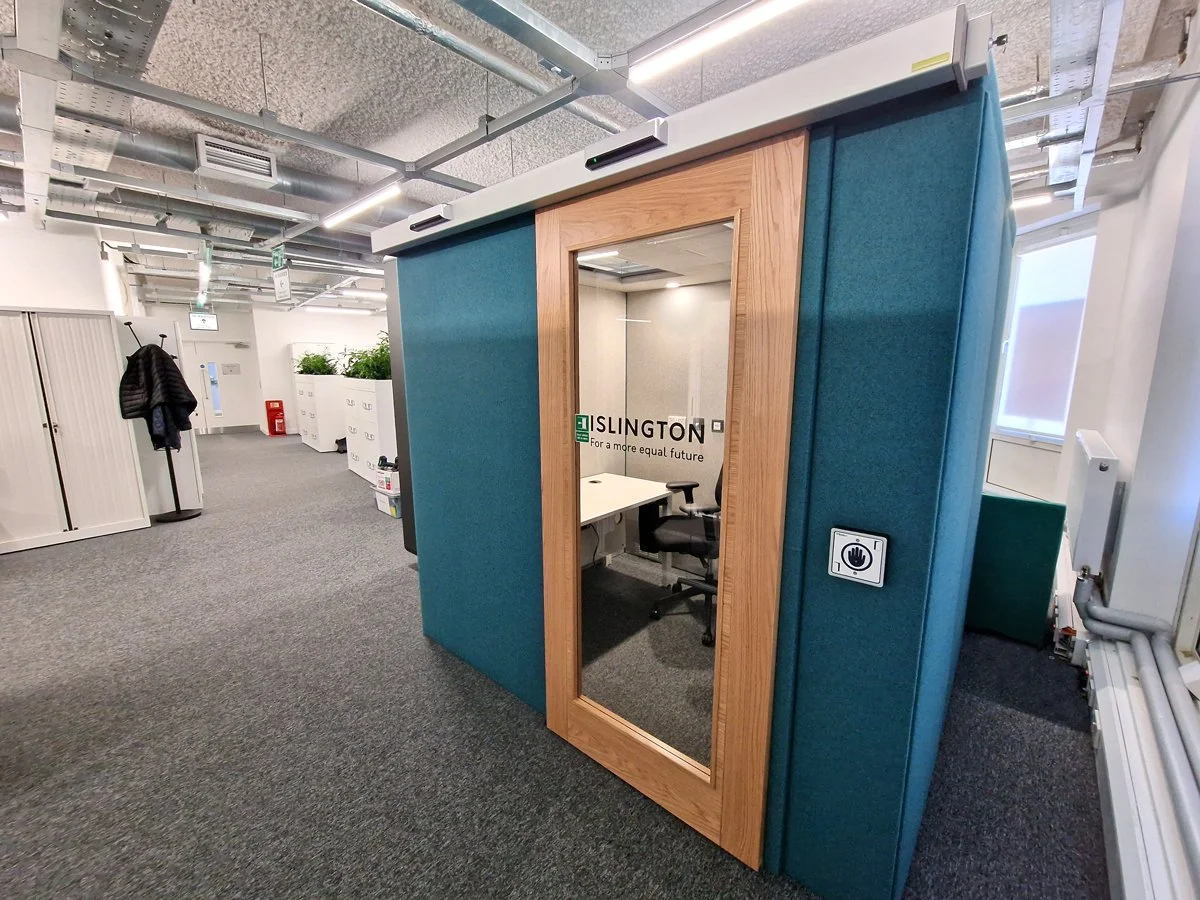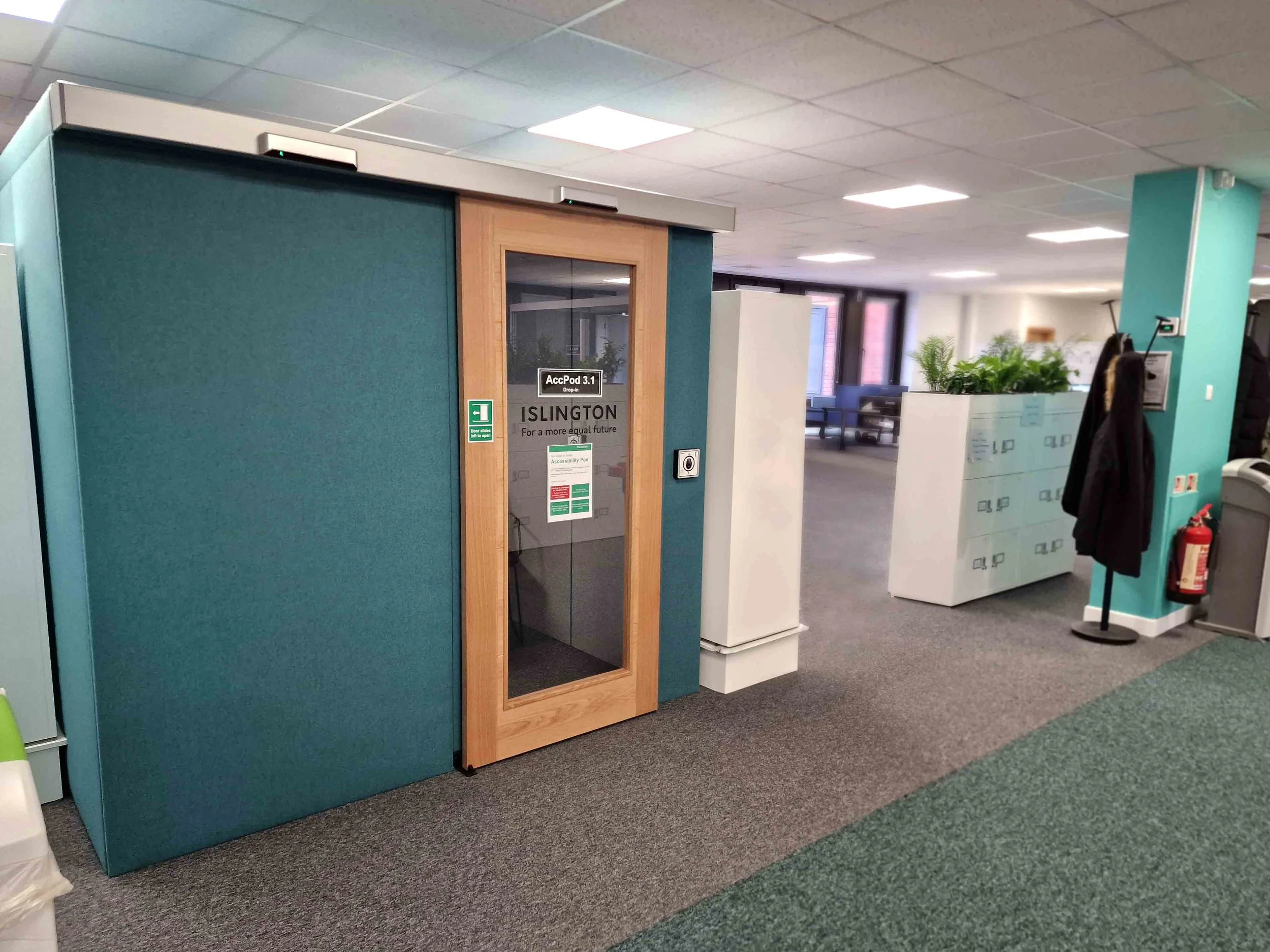Installation of Accessible Acoustic Pods with Automated Sliding Doors for Islington Council
Background
Islington Council, committed to creating inclusive and functional workspaces, identified the need for quiet, private areas within their busy administrative offices. To accommodate employees and visitors with varying accessibility needs, the Council decided to install several accessible acoustic pods equipped with automated sliding doors. This initiative aimed to enhance workplace productivity and inclusivity.
Objectives
To reduce noise levels and provide quiet spaces for focused work.
To ensure accessibility for all users, including those with disabilities.
To enhance the overall workplace environment by providing private, comfortable spaces for meetings and individual work.
To enhance the overall learning environment by creating a more conducive space for concentration and productivity.
Implementation
Needs Assessment: A comprehensive assessment was conducted to determine the specific requirements for the acoustic pods. This involved consultations with employees, accessibility experts, and facilities management to ensure the pods met all necessary standards for accessibility and usability.
Selection of Acoustic Pods: The Council selected AgileAcoustics AgilePOD#10 acoustic pods - our high-quality, soundproof designs and commitment to accessibility played a key part in winning the project. The pods featured automated sliding doors, spacious interiors, and were compliant with latest accessibility regulations.
Installation Process: The installation was planned meticulously to minimise disruption to office operations. Key steps included:
Site Preparation: Identifying suitable locations within the office for the pods, ensuring they were easily accessible and did not obstruct high-traffic areas.
Pod Assembly: The acoustic pods were delivered in modular units and assembled on-site by Agile’s in-house install team. Each pod was tested for sound insulation, door automation, and overall functionality.
Integration with Office Infrastructure: Ensuring the pods were seamlessly integrated with existing office infrastructure, including power supply and internet connectivity. Special attention was given to the placement of controls for automated doors to ensure ease of use for individuals with disabilities.
Outcome
Enhanced Workplace Environment: The installation of the acoustic pods has significantly improved the office environment. Employees reported a noticeable reduction in noise levels, allowing for better concentration and productivity. The pods provided quiet, private spaces ideal for focused work and Teams Calls.
Improved Accessibility: The automated sliding doors and spacious design ensured that the pods were easily accessible to all employees, including those with mobility impairments. Feedback from users highlighted the ease of use and the comfort provided by these accessible features.
Increased Utilisation: Since their installation, the acoustic pods have been in high demand. Employees appreciate the availability of quiet, private spaces for work and meetings.
Positive Employee Feedback: Surveys conducted post-installation revealed high levels of satisfaction among employees. Many noted that the pods provided a much-needed respite from the open-plan office environment, allowing them to work more efficiently and comfortably.
Conclusion
The installation of accessible acoustic pods at Islington Council has proven to be a successful initiative, enhancing both the functionality and inclusivity of the office environment. By addressing the need for quiet, accessible spaces, the Council has significantly improved the workplace experience for all employees. This case study underscores the importance of inclusive design in modern office settings and serves as an example for other organisations seeking to create more accessible and productive work environments.



